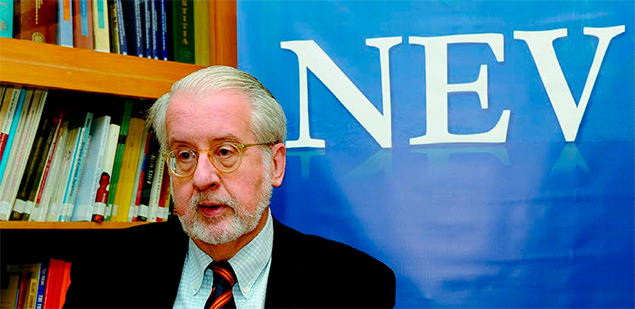Public Statement Against Political Persecution in Brazil
31 de July de 2020

It is with deep indignation that the Center for the Study of Violence (NEV-USP) receives the news that the Ministry of Justice and Public Safety, through the “Intelligence Directory of the Secretariat of Integrated Operations” (Decree No. 9662/19), has produced a list composed of names, pictures, and documents of public safety agents and public professors for supposedly manifesting opinions contrary to fascism, which constitute clear political persecution and is strictly forbidden by the Federal Constitution of 1988 (art. 5, subpara VIII). Among those listed figures Paulo Sérgio Pinheiro, a NEV’s founder. Paulo Sérgio Pinheiro is widely acknowledged by public authorities, national and international organizations as one of the most important personalities in Brazilian and international’s Human Rights history, for his academic work as well as for his political activism. Currently, he is the Chairman of the United Nations International Commission of Inquiry for Syria. He was also State Secretary for Human Rights in Brazil, and a member of the National Truth Commission. He is a Full Professor (now retired) of the Department of Political Science of the University of São Paulo; he has also lectured at Brown University, Columbia University, Notre Dame University, Oxford University, and École des Hautes Études en Sciences Sociales.
Paulo Sérgio Pinheiro coordinated, alongside Professors Sérgio Adorno and Nancy Cardia, one of NEV’s first studies, which still has impact in Brazil. The work “Authoritarian continuity and the Consolidation of Democracy” (1994-2000) analyzed the persistence of human rights violations during the Brazilian democratization process, along with the construction of citizenship post-constitution of 1988 and the reestablishment of the Rule of Law. Our current situation exposes what our studies have historically been indicating: that the authoritarianism remains present in our society and in the State, precluding advancements with respect to guaranteeing fundamental rights for our society as a whole.
The production of dossiers on any person for manifesting his/her opinions is an affront to the liberties of opinion and expression, one of the cornerstones of the Universal Declaration of Human Rights, of the Federal Constitution, and of the Brazilian Rule of Law. It constitutes a responsibility crime when performed by a State Ministry (art. 4, subpara II, Law No. 1.079/50). Classifying the document as of “restricted access” is another unlawful aspect of this action, once the right to information prohibits the restriction of documents regarding conducts which lead to human rights violations by public agents at the behest of public authorities (art. 21, Law No. 12.572/11). In other words, our law forbids restricting access to an action which is, in itself, a violation of fundamental rights. This initiative is another example of the willingness to return to the dictatorship period promoted by the current administration, in which repression and authoritarianism were a form of government. It is unacceptable, and amenable to legal hindrance, that the post of Ministry of Justice be used to politically persecute people who disagree with government opinions.
It is with deep concern that during this severely challenging moment in Brazilian history – as we currently figure as the second country in the world in number of deaths due to Coronavirus – we also have to witness State Agencies taking unlawful actions without legal monitoring, clearly against the Brazilian Federal Constitution of 1988.
The Center for the Study of Violence of USP has demonstrated, in its more than thirty years of existence with the exemplary leadership of Professor Paulo Sérgio Pinheiro, that public safety can only protect people, property, and institutions if it is performed with scientific evidence, accountability, and respect for fundamental rights. Therefore, it is urgent that the Federal Police, the Attorney General’s Office, and the Supreme Court, invested with the power bestowed to them by the democratic legislator, take all applicable action to investigate these surreptitious acts by the Ministry of Justice, and to apply all due sanctions.
São Paulo, July 25th, 2020.



